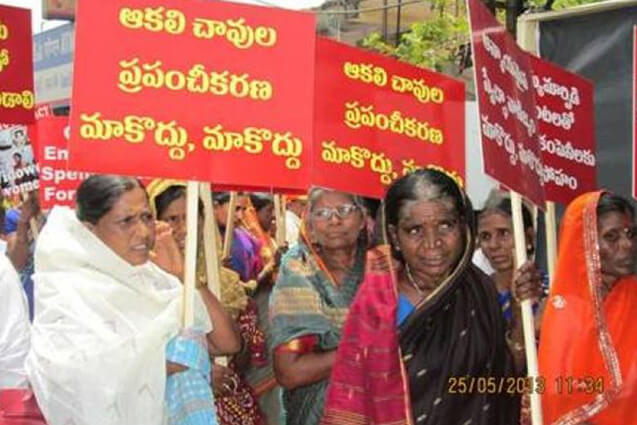India has a rich diversity of food cropswhich include millets, pulses, oil seeds, cereals, vegetables, various fruit varieties andcash crops like tobacco, cotton, sugarcane etc., that can feed the nation and meet all the other requirements.
Traditionally, farmers have saved their own seeds and handed over them to the next generation and so, safe and healthy foods went hand in hand with food sovereignty.
Then in the 1960’s, with the onset of green revolution,entered various improved varieties and high yielding hybrids breached into the diversity of our local crops. Along with this came the high usage of chemicals in the form of fertilizers and pesticides. Since then the face of Indian agriculture changed drastically with high input costs, dependence on markets, chemicals in foods leading to health concerns like cancer,indebtedness and farmer’s suicides.
About 20 years ago global biotechnology industry came forward with geneticengineering (GE), transgenic technology or recombinant DNA technology. It involves genetically modified organisms (GMOs) which are organisms in which the genetic material has been altered in a way that does not occur naturally. Companies promoting GM crops claim benefits like lower pesticide use (as pesticide production is done within the plant) and higher yields.
Genetically Modified Organisms (GMOs) and genetically modified food crops in particular have given rise to a huge controversy because of the adverse impacts they might cause on human/animal health and environment. There is a growing body of scientific evidence to point towards this potential risk. Many governments, independent scientists, consumer groups, farmer’s unions and citizens say that the benefits claimed by GM industry are more hype than truth and that the risks far outweigh the benefits.
There has been a big attempt to introduce GM crops in India, field trials have been permitted for certain crops by Genetic Engineering Approval Committee(GEAC) created under Environment Protection Act, 1986.
Genetically modified Bt cotton was introduced in 2002 and after 11 years we have a bitter experience of expanding cotton and increasing indebtedness and suicides of cotton farmers. Clearance was given for Bt Brinjal as a commercial crop by genetic engineering approval committee(GEAC) in October 2009 which faced stiff resistance throughout the country and a moratorium was imposed after public consultations by then Environment Minister Mr Jairam Ramesh in 2010 after country wide consultation.
The Parliamentary Standing Committee on Agriculture and the Technical Expert Committee appointed by Supreme Court have critically analyzed the evidence placed before them both for and against the GM crops and recommended in 2012 stalling of field trials of Bt food crops.
In this context the highly controversial Biotechnology Regulatory Authority (BRAI) Bill, 2013 was tabled in the parliament in April this year in spite of stiff resistance from farmers unions and state governments since 2008. This bill,though on paper a regulatory bill in reality is trying to legitimize the entry of GM products into India, and is going to be a tool to help the growth of GM industry.
RythuSwarajyaVedika, a forum of farmers, scientists, social activists, civil society groups and NGO’s working for farmer’s rights in Andhra Pradesh and part of Alliance for Holistic and Sustainable Agriculture (ASHA) at the national level has been involved in a campaign for a Biosafety Protection Act instead of the Biotechnology Regulatory Authority (BRAI) Bill and is mobilizing public opinion on this extremely important issue. An expert consultationwas organized by ASHA,NALSAR Law University and Centre for Sustainable Agriculture (CSA) on May 3rd2013 in Hyderabad involving leaders of farmer’s unions, scientists form ANGRAU on Biosafety Protection Act and the meeting demanded to withdraw BRAI Bill.
Raythu Swarajya Vedika along with Jana Vignana Vedika, NAPM and DDS organized a rally as part of Global March against Monsanto on 25th May, 2013 in Hyderabad where many women farmers and activists said NO to GM crops,upheld farmers rights and condemned company monopoly over seeds. Raythu Swarajya Vedika held a press meet on 17th June in which scientists and activists from CSA, Chetana Society, NAPM and AP Rythu Viththana Hakkula Vedika and demanded withdrawal of BRAI bill and bring in Biosafety Protection Act.
17 types of GM food crops – rice, wheat, jowar, groundnut, potato, tomato, cabbage, cauliflower Okra, brinjal, papaya, watermelon, sugarcane etc., are awaiting approval in India.There is an urgent need to come together and raise our voice against promotion of unsafe genetically modified food crops. Join hands with us to thwart the BRAI bill and instead demand for a Biosafety Protection Act to safeguard our health, environment, and food security and farmers seed sovereignty. Let’s protect our seeds, food, environment and our lives!(Ashalatha.S is an ActionAid fellowship holder woring in the Hyderbad region. She can be contacted at ashalatha.satyam@gmail.com
 Author: Ashalatha Satyam
Author: Ashalatha Satyam




